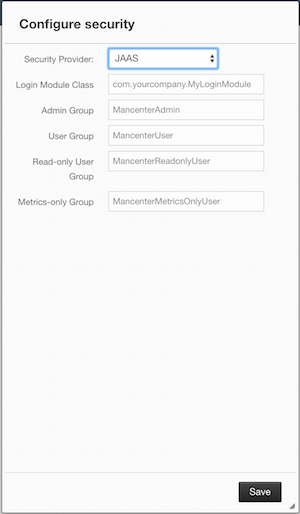You can use your own javax.security.auth.spi.LoginModule implementation for authentication/authorization on Management Center.
 NOTE: In order to use your own JAAS implementation, you have to pack it in a JAR and provide the JAR on Management center's classpath during startup. You can add a JAR to the classpath, e.g., by editing
NOTE: In order to use your own JAAS implementation, you have to pack it in a JAR and provide the JAR on Management center's classpath during startup. You can add a JAR to the classpath, e.g., by editing startManCenter.sh script.
In the "Configure Security" page, select JAAS from the "Security Provider" combo box, and the following page appears:

Provide the details in this form for your JAAS LoginModule implementation:
-
Login Module Class: Fully qualified class name of your
javax.security.auth.spi.LoginModuleimplementation - Admin Group: Members of this group will have admin privileges on the Management Center.
- User Group: Members of this group will have read and write privileges on the Management Center.
- Read-only User Group: Members of this group will have only read privilege on the Management Center.
- Metrics-only Group: Members of this group will have the privilege to see only the metrics on the Management Center.
Following is an example implementation. Note that we return two java.security.Principal instances; one of them is the username and the other one is a group name, which you will use when configuring JAAS security as described above.
import javax.security.auth.Subject;
import javax.security.auth.callback.Callback;
import javax.security.auth.callback.CallbackHandler;
import javax.security.auth.callback.NameCallback;
import javax.security.auth.callback.PasswordCallback;
import javax.security.auth.login.LoginException;
import javax.security.auth.spi.LoginModule;
import java.security.Principal;
import java.util.Map;
public class SampleLoginModule implements LoginModule {
private Subject subject;
private String password;
private String username;
@Override
public void initialize(Subject subject, CallbackHandler callbackHandler, Map<String, ?> sharedState, Map<String, ?> options) {
this.subject = subject;
try {
NameCallback nameCallback = new NameCallback("prompt");
PasswordCallback passwordCallback = new PasswordCallback("prompt", false);
callbackHandler.handle(new Callback[] {nameCallback, passwordCallback });
password = new String(passwordCallback.getPassword());
username = nameCallback.getName();
} catch (Exception e) {
throw new RuntimeException(e);
}
}
@Override
public boolean login() throws LoginException {
if (!username.equals("emre")) {
throw new LoginException("Bad User");
}
if (!password.equals("pass1234")) {
throw new LoginException("Bad Password");
}
subject.getPrincipals().add(new Principal() {
public String getName() {
return "emre";
}
});
subject.getPrincipals().add(new Principal() {
public String getName() {
return "MancenterAdmin";
}
});
return true;
}
@Override
public boolean commit() throws LoginException {
return true;
}
@Override
public boolean abort() throws LoginException {
return true;
}
@Override
public boolean logout() throws LoginException {
return true;
}
}
